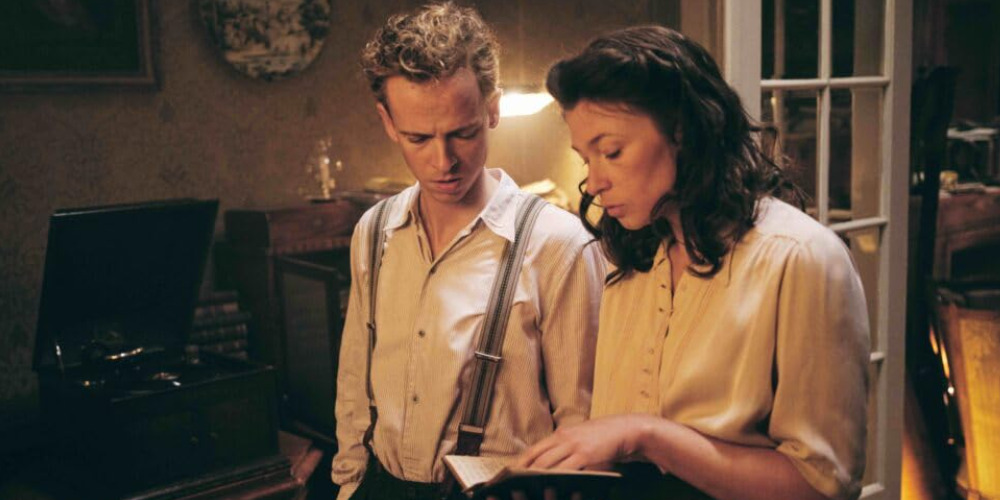Netflix’s Belgian film, ‘Will’ takes the viewers to the haunting landscape of 1942 Nazi-occupied Antwerp, where it follows the story of one police officer who finds himself in an impossible moral quandary. Wilfried Wils, with an artist’s soul, joins the city’s Police Force and soon learns about their official unofficial bystander policy of German violence against their Jewish population. However, on one grueling night patrol, Wils and his partner, Lode Metdepenningen, are unable to stand still and watch the Feldgendarm deliver a family of three to their tortuous fates.
As a result, the two men end up caught in a tense situation where they must choose between immoral collaborations with the Nazis or their morals, which come at the cost of their own self-preservation. After the night’s incident, Wils ends up aligning himself with an underground resistance group that Lode and his sister, Yvette, are a part of. The latter’s character instantly becomes instrumental within the narrative with her bold, unflinchingly rebellious nature. Consequently, the woman’s suicide must’ve had an effect on the viewers, compelling them to wonder about her motives. SPOILERS AHEAD!
Yvette: A Fierce Resistance Fighter
As Lode’s sister, Yvette falls into the film’s narrative early after her brother’s altercation with the Feldgendarm. Lode’s actions— condemning a German Nazi officer and delivering him to his death for the protection of a Jewish family— can have immense consequences on the man upon discovery. The law can brand Lode and Wils traitors and treat them as such. For the same reason, Yvette is concerned about her brother’s safety and cautious of the stranger who holds their fates in his hands.

Nevertheless, Wils, who delivered the deadly blow to the Feldgendarm, showcases no signs of trouble. Even though he contacts Felix Verschaffel, a known patron of violent anti-Semitic sentiments, at his father’s behest, he doesn’t seem to hold any bigoted emotions toward the Jewish community. In fact, once Wils gets to know Lode better and realizes that his family has been aiding the White Brigade, a Belgian resistance group, the man decides to join the movement.
Consequently, Wils and Yvette embark on some sleuthing adventures to learn about Verschaffel’s violent extremist group and their plans to raid Jewish establishments and homes. As a result, the pair’s missions end up saving lives once they’re able to warn the others of upcoming raids to help them clear the area. Wils and Yvette end up bonding over the same and develop a romantic relationship.
Yvette is headstrong with her morals and doesn’t shy from communicating them to Wils, threatening to end his life should he betray them. She’s dedicated to the cause and only starts opening up to the man once he showcases signs of the same.
Yet, Wils remains torn between his own self-preservation and the greater good. Gregor Schnabel, a high-post German officer in charge of Feldgendarm’s murder investigation, openly suspects Wils and Lode’s involvement even though he can’t prove it. As a result, through targeted manipulation and twisted mind games, the man manages to get some of the truth out of Wils in a drunken haze, effectively putting Yvette and her accomplices in a compromised position.
Yvette’s Fatal Demise
Even after Wils’ massive misstep, the man manages to avoid prosecution after someone else ends up taking the fall for the Feldgendarm’s death. However, a different problem arises when it becomes impossible for Chaim Litzke and his family to stay in Antwerp. Litzke is the man whose house was raided by the Feldgendarm before the latter’s death. Therefore, since Wils saved Litzke, his wife, Myriam, and their young daughter’s lives, he also helps them hide from prying eyes by stowing them in his safe house. Still, the same is only a temporary solution.

Eventually, Wils ends up helping them skip town by using the resistance’s resources to forge passports for the Jewish family and get them boarded on a train. The event brings immense joy to Wils, Yvette, and Lode, who celebrate Litzke’s family’s safety. Yet, the celebration is short-lived. Soon, Wils learns that Gregor’s men discovered the family aboard the train and identified their fake IDs. Thus, the Litzke and his family faced swift deaths.
Furthermore, Gregor was able to trace the ID back to The Professor, who helmed the resistance meetings that Wils and his friends have been a part of. As such, Gregor gives the officer an ultimatum. He knows Wils has been feeding the rebels information about raids to help them flee to safety. Therefore, he orders the man to feed the resistance false information to ensure the Germans’ raid goes swimmingly.
After Wils conveys the same message to Yvette and Lode, the woman decides she would rather die than be responsible for the loss of innocent lives. Yvette is the perfect opposite of the Antwerp police force, who believe they can be bystanders to inhumane atrocities without condemning themselves. Inversely, Yvette believes there’s no such thing as an innocent bystander. For the same reason, she demands Wils to share the real raid location with her so that she can warn the others, ready to face the consequences of her actions.
Nonetheless, Wils doesn’t share the same opinion. The man desperately wants to be good and help others. Still, he can’t condemn himself and his loved ones for the sake of others. Blatant self-sacrifice simply doesn’t come as easily to Wils as it does to Yvette. Thus, he shares the wrong location with his girlfriend, informing her that the Germans are planning to raid Pelikaanstraat rather than Terlistraart. Yvette believes him without question, convinced her lover wouldn’t trick her.
As such, Yvette convinces the resistance, who already suspected the right location for the raid, to empty Pelikaanstraat instead. However, in the end, the woman watches the Terlistraart raid unfold and realizes that Wils lied to her. Worse yet, Wils has moved on from being a bystander to actively participating in the raid to follow his superiors’ orders and avoid condemnation.
The betrayal rips everything away from Yvette, who can’t help but blame herself for the lost lives. Since the resistance already had the correct intel, they could’ve saved everyone if Yvette hadn’t convinced them otherwise. Therefore, she can’t bear to live with herself and her actions any longer.
Furthermore, Yvette can’t forgive Wils for his betrayal since his manipulation drove her actions. Consequently, she flees to the train tracks with Wils following in tow. Ultimately, she stands at the train tracks in front of an incoming train, giving up her life. Yvette knew that her contribution to saving Jewish lives was small and that she couldn’t face the Nazis and their ideology alone. Yet, helping in whatever capacity gave her a sense of self. Therefore, once Wils stole that away from her in an effort to keep her safe, she couldn’t live with herself any longer. Thus, Yvette commits suicide in the end.
Read More: Are Wil and Lode Based on Real Antwerp Police Officers?


You must be logged in to post a comment.